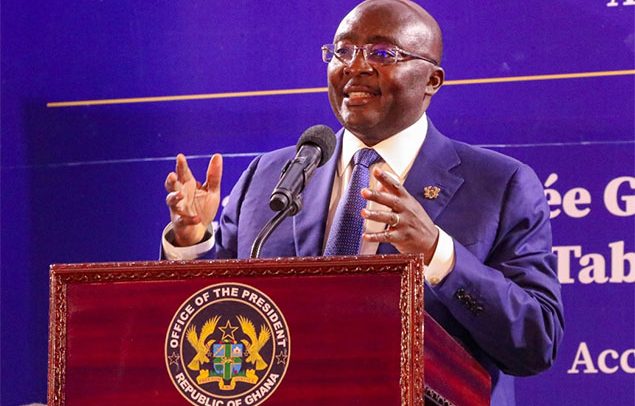Vice President Mahamudu Bawumia
VICE PRESIDENT Mahamudu Bawumia has hinted of government’s intention to implement “bold, difficult but firm decisions” in the coming days to ensure fiscal discipline and debt sustainability.
He said there was the urgent need for government to take some drastic measures to come out of its current economic challenges.
These include the need to restore fiscal and debt sustainability, limit import dependency and retain the chunk of the country’s foreign exchange earnings.
That, he said, was part of reasons why fiscal and debt sustainability should be put on the negotiation table with the International Monetary Fund (IMF).
“For us to address the current economic crisis, we have to take very bold, difficult and firm decisions and adjust to the global and domestic realities,” he said.
He gave the prescription when he addressed the second edition of the Standard Chartered Digital Banking Innovation and FinTech Festival in Accra yesterday.
Dr. Bawumia also emphasised the need for the nation to be self-reliant with regards to the mode of production of basic consumer items such as rice, tomatoes and tooth pick, saying, “We have to reduce import dependency as a nation.”
“Our foreign exchange regime is quite loose and we must tighten it. We have to change the nature of production and trade services because, most of our foreign exchange earnings on trade do not stay in Ghana and so, we’ve been having recurrent account deficits,” the Vice President noted.
According to Dr. Bawumia, the ongoing change in the world economic order, coupled with the rising inflation and disruptions in global supply chains meant that countries like Ghana could no longer operate in a business-as-usual mode but had to rapidly pivot and become self-reliant.
Dr. Bawumia also stressed the need to digitise the African economies to enhance financial inclusion and also take advantage of the fourth industrial revolution.
He touted Ghana’s credentials as a leader in Africa in terms of digitising her economy, noting that the country reached a maturity stage in access to financial inclusion.
“Just this morning, I was reading that Ghana has reached a maturity stage in access to financial inclusion at the ongoing Mobile World Conference in Rwanda,” Dr. Bawumia said, adding “Ghana scored 100 per cent financial inclusion.”
He attributed the successes chalked in Ghana’s financial inclusion journey to the various digital infrastructure, mobile money interoperability payment system, Universal QR Code, Ghana.gov payment platform and other policy interventions rolled out by the government.
On his part, First Deputy Governor of the Bank of Ghana, Dr. Maxwell Opoku-Afari, said the Central Bank, in the past few decades, had been at the forefront of implementing innovative policies to propel the country’s digital economy forward and promote efficient digital ecosystem, anchored on robust interbank infrastructure.
He cited various legal and regulatory frameworks rolled out to promote mobile financial services, including the enactment of the Payment System and Services Act, 2019 (Act 987).
Chief Executive Officer of the Standard Chartered Bank, Mansa Nettey, in a welcome message, said digital banking was at the core of ensuring effective and efficient services and, thus, outlined various interventions the bank had rolled out to meet its clients’ banking needs.
She also commended the Bank of Ghana and Vice President Bawumia for the strategic roles they have played in the country’s digital revolution.
Ms. Nettey indicated that, “Over the next two days, we will explore opportunities that exist in using digital technology to unlock Africa’s economic growth and focus on regulations that protect and enhance digital trade. We will delve into the future of banking, money, and payment systems in solving the complex financial inclusion challenges on our continent.”
She also announced a session dedicated to women in technology, where “we will discuss the urgent need for women-owned businesses to tap into the enormous opportunities offered by technology adoption and explore investment opportunities to help female-owned businesses scale further and faster.”
She added that a series of plenary sessions would explore the opportunities for co-creation, to embrace digitisation, and the extent to which platforms and payment systems are currently adding value and helping industry players to be agile amid the disruption.
“We have curated an exciting innovation and lab crawl as well as a Fintech Exhibition with participating fintechs from Singapore, UK, Ghana and other African countries. Our connection hub and experience zones will also deliver “need based” paired business engagements and real future tech experiences respectively.
“Tomorrow afternoon we will turn our attention on the next generation of innovators. In collaboration with SC Ventures, we have in the last week as part of this festival, organised a Human Centered Thinking Design session for young innovators across the country and they will be presenting to us tomorrow,” the CEO added.
The two-day forum is on the theme: “Towards a Digital Economy; Positioning Africa as a FinTech Innovation Hub.”
It attracted entrepreneurs, government officials, policy-makers and financial and fintech experts across the globe to brainstorm on how to build robust digital economies in Africa.
BY Charles Takyi-Boadu


